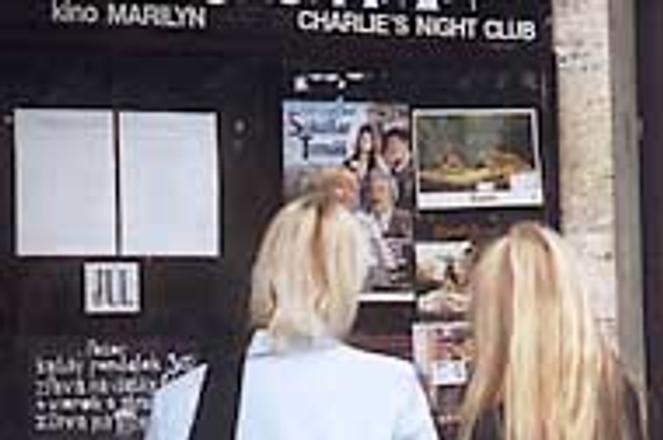RECENTLY closed Charlie's cinema will soon reopen as a refurbished film club.photo: Zuzana Habšudová
OPERATORS of small Slovak cinemas have for years struggled with decreasing attendance figures, and recently opened multiplexes in the Bratislava area have not helped, pushing many smaller competitors to cut performances or close altogether.
Two well-known cinemas in Bratislava's downtown core have closed this summer due to what industry insiders say is the pull of more comfortable and better-equipped multiplexes located in suburban shopping centres.
"Other cinemas have felt the impact of multiplexes for sure. We experienced a drop at all individual [Bratislava] cinemas," reported Ivan Sollár, head of the Slovak Union of Film Distributors.
The answer, says Sollár, is simple: Small local cinemas must adapt to customer needs and invest money to survive. Fortunately for Slovak movie fans, at least one company has just that in mind.
With many people on holiday or enjoying outdoor activities, summer is traditionally the weakest season for movie theatres in Slovakia, and summer 2002 has seen a number of shake-ups in the cinema market.
Following the opening of Slovakia's second multiplex in the Bratislava Aupark shopping centre this spring, the consequences for smaller theatres became clear.
Two prominent cinemas in Bratislava's city centre - the Tatra and Charlie's film houses - cancelled rental contracts, saying that after years of uninterrupted performances, declining revenues and high rent had made their businesses financially unfeasible.
"When our earnings fell dramatically due to the impact of multiplexes, we had to cancel the rental contract for the Charlie's [building]," said Rudolf Bierman, a movie producer who had operated the cinema until August.
"We have ended [the Tatra]. The conditions we got from our landlord were so harsh that we could not accept them any longer," added Igor Ličko, legal representative of Istropolis Cinema, which ran a landmark Bratislava cinema in the Hotel Tatra building near the presidential palace.
Industry experts have attributed Slovakia's long-term decline in film attendance largely to the dilapidated state of many domestic cinemas, as well as the lack of investments to raise quality.
"Greater comfort, air conditioning, services like cafés and fast food restaurants, and of course better technical equipment to improve sound and picture quality," are factors that could lure viewers to now empty small-town cinemas, which often have wooden seats and communist-era projection equipment, said Sollár.
Vojtech Kabath, general manager of the Ster Century multiplex in Bratislava's Polus shopping centre, agreed. "The Slovak viewer is changing. People want higher quality, and cinemas that are not able to produce it simply can't survive."
However, rather than leaving Bratislava customers with two fewer cinema options, Istropolis has come up with a plan to revive the Charlie's cinema, as well as expand on non-commercial screenings, by creating a four-screen film club.
"The truth is that the Slovak Film Institute, which administers the [Charlie's] building as state property, really set quite difficult conditions. Our calculations, however, show that we can handle it financially, and our coming here represents a reasonable step," said Ličko.
"We will exchange the one screen that we had in the centre of the town at the Tatra for four of them in the [newly established] film club," he added.
Besides screening new Hollywood releases, the new Charlie's club will join the existing Association of Slovak Film Clubs (ASFK) in offering a wide range of non-commercial, artistic and historic films by directors from around the world.
ASFK now operates a nation-wide film distribution network, and club membership costs a small annual registration fee of around Sk50 ($1).
Istropolis sees the resurrection of Charlie's as one step in an ambitious plan, already nine years in the making, to revive local cinemas through investment and reconstruction.
Beginning in 1993, the company began taking over and rebuilding cinemas across the country, and now operates the 11-theatre Istropolis chain.
"Our goal is to optimise the operation of cinemas, modernise their worn out equipment and offer services which are now considered unthinkable in small theatres - popcorn and refreshments, for example - and thus increase people's interest in cinema," says the company's strategic outlook.
According to Ličko, the Charlie's move gels perfectly with this plan. "[Charlie's] location in the centre of the city, its comparable quality and the fact - which we consider the most important for us and the viewer - that there will be no commercial pressure exerted on viewers in the film club," will help prevent audiences bypassing Charlie's for suburban multiplexes, he said.
"I believe a generation is growing up that is resisting this [commercialisation] and prefers to go to a regular cinema. Moreover, foreign practice shows that modernised multi-projection cinemas in the city centre can prosper financially," he added.


